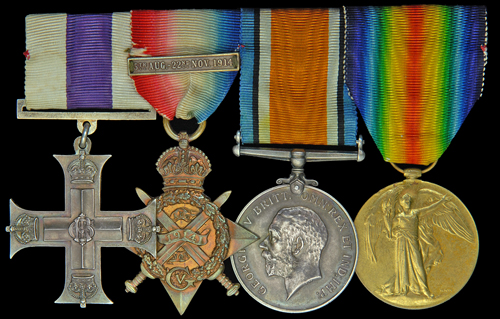
Auction: 8010 - Orders, Decorations, Medals & Militaria
Lot: 164
A ´1918 Hindenburg Line, Attack on Ronssoy´ M.C. Group of Four to Captain G.E. Gott, Bedfordshire Regiment, Awarded For Gallantly Leading His Company in the Capture of Three Machine Guns and 20 Germans Prisoners a) Military Cross, G.V.R., unnamed as issued b) 1914 Star, with Bar (Lieut: G.E. Gott. Bedf: R.) c) British War and Victory Medals (Capt. G.E. Gott.), very fine or better, mounted as originally worn, sold with a large amount of photocopied research, including several extracts from the Regimental Newsletter Wasp, in which the recipient is mentioned several times, and indeed some of his letters are published (lot) Estimate £ 1,200-1,400 M.C. London Gazette 30.7.1919 Capt. Gerald Ewart Gott, 2nd Bn. Bedf. R. ´´For conspicuous gallantry and good leadership in command of a supporting company in an attack on Ronssoy, September 18th, 1918. He early became engaged with the enemy and overcame all opposition, capturing three machine guns and twenty prisoners and killing many. On reaching his objective he reorganised his company under heavy shell fire and thoroughly cleared this area of all hidden enemy.´´ Captain Gerald Ewart Gott, M.C., born 1893; passed out from Sandhurst to be commissioned Second Lieutenant 2nd Battalion Bedfordshire Regiment, 14.2.1912; served with the Regiment during the Great War on the Western Front from 6.10.1914, including on the 23rd of the same month when he was in action at the 1st battle of Ypres, Gott led an assault alongside the Royal Scots Fusiliers on the Poezelhoek Road, towards Becelaere, ´´there were many casualties among the men and Lt. Wright was killed. We heard some months afterwards from an officer in the Royal Scots Fusiliers that one platoon was very gallantly led by an officer in an assault on a house containing machine guns. There is reason to believe that the platoon refferred to was that commanded by Lt. E.G. Gott´´ (Regimental History, refers); Gott was in action again on the 31st of October when he was severely wounded leading an assault through a fir wood off the Menin Road at Gheluvert, ´´a written order was at once sent to Cpt. Lemon to retire from the fir wood upon the Battalion. The two platoons suffered severely Lt. Patterson was killed Lt. Gott was wounded but brought out.´´ (Regimental History, refers); after recovering from his wounds Gott was attached for service as a Temporary Captain with the Machine Gun Corps, 31.8.1916-20.1.1917; he rejoined his old battalion in August 1918, in time to take part in the attacks on the Hindenburg Line, including the battle of Ronssoy (18.9.1918) for which he was awarded the M.C., ´´At dusk on the 17th the Battalion moved to assembly positions west of Ronssoy. The Brigade plan was that the 7th Royal West Kents, who had been attached to our Brigade, were to advance eastwards and capture a line roughly two miles ahead. We were to follow, and in conjunction with the 24th Welsh Division on the right were to "attack, capture and consolidate the southern portion of the village of Ronssoy." The other two battalions of our Brigade, as soon as we had got to our objectives, were to form up at right angles to our advance and attack northwards... At 5.20am the assault began; in the darkness the 7th Royal West Kents drifted slightly to the right, so that our leading companies, who were following in support, became involved in the fighting. Capt. Gott´´s Company specially distinguished itself by clearing a spinney where three machine guns and thirty prisoners were captured, and many killed... Capt. G.E. Gott, who had only recently rejoined the Battalion from wounds received in the First Battle of Ypres in 1914 was awarded the M.C. for the way he handled his company early in the day´´ (Regimental History, refers); Gott was one of the 9 officers of the battalion wounded during this action, with 23 other ranks killed and 99 wounded; 400 hundred Germans were taken prisoner, with 30 machine guns captured; after the War, Gott retired from the Army due to ill health caused by his wounds, he later settled as a farmer in Mooi River, Natal, South Africa.
Sold for
£2,400




